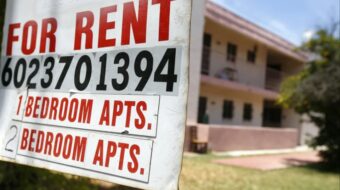While much of the corporate media, most political pundits and much of the country’s elected leadership would like to characterize America as a “post-racial” society in which “colorblindness” rules, newly released data reveals that racially-based economic inequalities may be at their worst levels since the 1990s.
According to fresh statistics from the Census Bureau, the recession and the housing crisis have most adversely affected African American and Latino families. In 2009, the median income for African American households fell 4.4 percent to just $32,584. That represents just 60 percent of the median income of white households. In the same period, Latino households saw a roughly similar income gap with white households, though they actually felt a 0.7 percent rise in incomes.
Poverty rates for African Americans and Latinos also grew 1.1 percent and 1.9 percent respectively, the Census Bureau found. More than 21 million people who self-identify as African American or Latino live below the federal poverty line.
The federal government also reported that more than 50 million Americans went without health insurance in 2009. Almost half, or nearly 24 million, were African Americans or Latinos.
In addition recent Department of Labor data shows unemployment rates for African Americans stands at 16.1 percent, while Latinos are at 12.4 percent, totaling close to 6 million people.
Five years ago whites enjoyed a homeownership rate that was some 50 percent higher than African Americans and Latinos, a figure that had been closing over the previous period. Since the collapse of the housing market in 2007 and 2008, homeownership rates for African Americans fell substantially in 2009. In fact, Census Bureau estimates show that African Americans have fallen to the same rates as 10 years ago. Compared to then, the rate of white homeownership has grown by more than four percentage points.
The importance of homeownership extends beyond simply the “American dream” of owning a home. High homeownership rates provide a financial basis for long-term family stability, educational opportunities, and community strength through a solid tax base.
This data reveals the impact of historically structured economic inequalities on African American and Latino working families. It reveals the extent to which all working families have a stake in pressing a political agenda that provides for the needs of working men and women: the need to create good-paying, union jobs, provision of universal healthcare, opportunities for housing, good schools, and effective and efficient measures to fight poverty.
The Republican Party, its ideology and its policies, lie at the heart of the economic crisis that expanded economic inequality. As one blogger for the AFL-CIO recently noted, the Republican plan to cut taxes for the richest Americans, to gut education funding by tens of billions of dollars, to privatize Social Security and their push to repeal health reform has nothing in common with the needs either of working families of color or any working families at all, for that matter.
As Tony Carrk, a policy analyst for the Center for American Progress Action Fund, suggested, “Like so many families in America, communities of color are facing a stubborn job market, tighter budgets, and increased health care costs. The fact is that the Republican “Pledge to America” will make their situation worse, not better.”

MOST POPULAR TODAY


Zionist organizations leading campaign to stop ceasefire resolutions in D.C. area

Communist Karol Cariola elected president of Chile’s legislature

Afghanistan’s socialist years: The promising future killed off by U.S. imperialism

High Court essentially bans demonstrations, freedom of assembly in Deep South






Comments